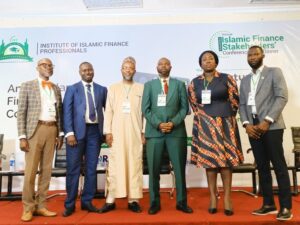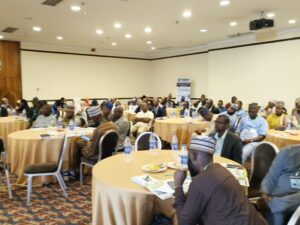By Rasheed Abubakar
– As experts express need for shari’ah compliant financial products, services
+ Muslim News, Jaiz Bank, Al-Barakah, others to receive Islamic Finance Industry awards today, Friday
About 20 prominent speakers and experts in the Islamic finance industry have envisioned a bright future for Islamic fintech in Nigeria.
The experts who included Islamic finance policymakers, Islamic finance professionals, MD/CEOs of Islamic Financial Institutions (IFIs), Islamic scholars, academics, leaders and managers of Islamic organisations, spoke on Thursday, December 15 at a two-day Islamic finance stakeholders’ conference.
The Conference was held at Sheraton Hotel and Towers, Ikeja, Lagos, with the theme: “The Future of Islamic Fintech in Nigeria: products, policies and shari’ah compliance.”
The annual event, which continues today, Friday, at the same venue, with the award and dinner night, was organised by the Institute of Islamic Finance Professionals (IIFP), a pioneer Islamic Financial Institution in Nigeria, founded in 2014, for building capacity, promoting Islamic financial practices and advocating best practice in the Islamic financial sector in Nigeria and globally through research, teaching and learning activities for professional membership.
In one of the panel sessions monitored by Muslim News, stakeholders said fintech should be embraced by Islamic financial institutions as it would add value to service delivery and customer experience.
They lamented the low and poor adoption of fintech by Islamic finance stakeholders and advocated for better and increased implementation.

However, the experts emphasised the need for compliance with the shari’ah in deploying fintech products and services.
‘Future of fintech in Nigeria is bright’
One of the panellists, Dr. Ishaq Muhammad Mustapha of Taj Bank Limited said opportunities are abound for fintech in Nigeria considering its population.
He noted that fintech is financial service facilitated through some form of technology.
“Fintech is just a way of providing financial services. If you need to for instance make a payment, take a facility, buy something, or you need money from a bank or something of that nature, fintech comes as a way for you to get that service using technology. If you don’t have to go to the bank because you have a phone and using your phone, you can press one, two, or three taps and get your money delivered to you, that’s fintech. If you need to buy financial assets, maybe sukuk or you need to pay for something, and you don’t need to go physically to take cash and pay, but you get the same done through technology, that’s fintech.
“The future of fintech in Nigeria is bright. If you look at our population (estimated at 200 million), say 50 percent are Muslims, that’s a huge market and potential. These people will need financial services of different kinds.
“The advancement in technology makes it entirely easy and convenient to deliver these services to people outside the geographical zones where respective financial institutions are operating. So, I don’t have to be in Lagos for instance, to get served by a financial institution or firm in Lagos. No matter what, I can always access it. This is the benefit of fintech.
“I think opportunities are abound in Nigeria compared to others countries. More products are coming. Our policies are a bit behind schedule, but again, it’s one of the characteristics of a developing market.”
However, shari’ah compliance is an area that requires some sort of improvement. This is not to say it’s bad right now, but that it could be enhanced. The future is bright for Islamic fintech in Nigeria.”
‘More Work Still Needed To Be Done, Says Balogun
For his part, Co-founder/CEO of PayVantage, Mr. Olufemi Balogun, stressed the need for a robust synergy between financial institutions and fintech players.

Olufemi, whose company leverages emerging technology that cuts across AI and blockchain to address customers’ pain points, has existed for four years and noted that most conventional financial institutions see fintechs as competitors.
“On the contrary, we need to see fintech as an enabler. We need to position fintech as an enabler to drive the growth of Islamic financial institutions and drive financial inclusion, delivering incremental revenue growth for Islamic financial institutions and improving transaction security and integrity.
“I think fintech adoption is growing and encouraging but tailoring it down to Islamic fintech, there is still much work to be done, and tremendous opportunities exist for the players in this space.
“We should implore more Muslim tech guys to leverage the opportunity in the space and deliver more value to customers and stakeholders in the value networks. The goal is that we will be leveraging technology to make ourselves better Muslims and see the pleasure of Allah (SWT),” he said.
‘Muslims Are Still Lagging’
MD/CEO of Ashab Consults, Ms. Aishat Abdulqadir Zubair, lamented that Muslims are not keying into the innovative products of fintech.
Abdulqadir Zubair, who teaches Islamic Law said this may be linked to a lack of awareness on the part of Muslims, adding that thorough sensitisation must be done, especially to let them know the boundaries the shari’ah has set for fintech products.
“How can we include the excluded Muslim population in the Islamic financial system because even globally, the financial system has been excluding Muslims a lot? We hear of cryptocurrency and e-naira, but a lot of Muslims are not keying into these. Some of them are probably ignorant or not interested in Islamic finance. So, we need to get them involved in it and let them know the boundaries that the shari’ah has set for it. The Muslim population should not be excluded from all these innovations going on globally.
“Anything we are doing in Islamic finance, the bedrock is that it must be shari’ah compliant. If it is not shari’ah compliant, it is not Islamic finance. Shari’ah compliance is the basis. The underlying contract we are using, the agreement, everything has to go through a process. We have a shari’ah governance structure, where we have the Internal Advisory Council of Experts. So, whatever product we are bringing in must go through them. Once they certify that this product is halal, that’s when we can roll it out to the public. Without Shari’ah compliance, we cannot have Islamic finance.”

She said Muslims must be encouraged to partake in this emerging trend of fintech because they are still far behind, adding that apart from getting value from it, it is a form of ibaadah if done in line with the shari’ah.
‘IIFP deserves accolades’
Another panellist, Mr. Tunde Ajani of Trust Arthur, lauded the organisers of the conference, saying it brought stakeholders together to brainstorm on how to take the Islamic finance industry to greater heights.
He explained that compliance with shari’ah is very paramount while dealing with fintech products.
Ajani added that shari’ah-compliant transactions may be costly but the gains are enormous.
“Non-Shari’ah compliance risk is the first when we talk about the Islamic industry. All other risks follow. The moment you can mitigate your non-shari’ah compliance risk, you will do less in other risks associated with any transaction.
“Of course, some would mention that there are costs to having shari’ah-compliant transactions. Globally, it’s agreed that having shari’ah-compliant transactions is also an added cost. But you would continue to have more advantages when your transactions are done in line with the shari’ah,” Ajani remarked.
‘Why we are focusing on Islamic fintech’
Earlier in his address, the President and Chairman, Governing Council of IIFP, Prof. Tajudeen Yusuf, clarified that the conference is an annual event with the 2022 edition making the 5th in a series.
He said the theme (The Future of Islamic Fintech in Nigeria; Products, Policies and Shari’ah Compliance) has been carefully chosen to leverage fintech to grow the awareness, marketing and promotion of non-interest finance in Nigeria.
According to him, Through fintech, we would achieve faster and be more impactful in the economic landscape of the country. We would also jumpstart the contribution of Islamic finance to the Nigerian economy and enhance inclusion.
Prof. Tajudeen also decried the low participation of Nigerian Muslim finance stakeholders in fintech, saying fintech could be useful in driving the financial inclusion of citizens.
“The rate of Muslims in fintech is abysmally low and very poor. Sometimes, when you are living in Lagos, you want to think that Lagos is Nigeria. Not so. When you go outside Lagos, that’s when you see the real Nigeria. Many people are cut off.

“Look at the central bank policy on the redesigning of the currency, complaining that most of the currencies are not within the formal sector because people are not dealing with the banks. They are keeping monies in their homes. That’s the challenge. Look at insurance too for instance, less than 10 percent of Nigerians have anything to do with insurance companies. Ten percent of 200 million. Many Nigerians are cut off. So, how do you bring them in? The more Nigerians we have playing in the economy, the better for the economy. We are a very huge population. For every four black men you see, one is a Nigerian. So, we want to use fintech to drive this financial inclusion movement. And then, people are now being more ethically conscious. They want to do things in line with the shari’ah.”
Muslim New, Jaiz Bank, Al-Barakah to receive awards
The event continues today, Friday, with a dinner and award ceremony to celebrate individuals and corporate bodies who have contributed to deepening the growth of Islamic finance in Nigeria.
The award night starts at 6 pm (Nigerian time) with the registration fee of N35,000 only.
According to Prof. Yusuf, the award is in two categories. The first category is the Islamic Finance Impact Award in Banking, Capital Market and Takaful while the Islamic Finance Advocacy Award is for individuals and corporate bodies.
Your darling Islamic newspaper, Muslim News is interestingly also part of the awardees at the elite event, recognised for its impact on reporting Islam in Nigeria. Others are; Jaiz Bank plc, Noor Takaful Insurance PLC, one17 capital limited, Al-Barakah MFB, among others.
……



